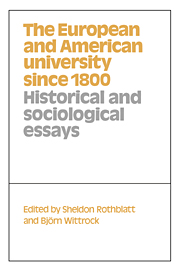Book contents
- Frontmatter
- Contents
- Notes on the contributors
- Introduction: universities and ‘higher education’
- Part I Fact and ideals in liberal education
- Part 2 The State, the university, and the professions
- Part 3 The ambiguities of university research in Sweden and the United States
- Part 4 Complexity
- Part 5 The ironies of university history
- Index
Introduction: universities and ‘higher education’
Published online by Cambridge University Press: 04 August 2010
- Frontmatter
- Contents
- Notes on the contributors
- Introduction: universities and ‘higher education’
- Part I Fact and ideals in liberal education
- Part 2 The State, the university, and the professions
- Part 3 The ambiguities of university research in Sweden and the United States
- Part 4 Complexity
- Part 5 The ironies of university history
- Index
Summary
The university is the second oldest institution with a continuous history in the Western world, the first being the Roman Catholic Church. That much is generally known. Less generally known – except to those who fuss with it – is that the problem of defining ‘university’ has long preoccupied politicians, planners, reformers, academics, theologians, philosophers, historians, and litterateurs. They have often found the task impossible. So much has this been the case, especially since the eighteenth century, that universities are now subsumed under a broader if less romantic category called ‘higher education’. It is less romantic because ‘higher education’ implies levels of bureaucratic and technocratic organisation and coordination that the word ‘university’ never does.
So this book is also about the tension between universities and ‘higher education’, between a special sort of cultural inheritance with idealistic, ‘spiritual’, and ‘high-minded’ aspirations derived from important philosophical and theological traditions, and a different but no less important set of beliefs which have constantly pushed universities towards a broader and more open set of social or service obligations. Universities have both resisted and accepted, often simultaneously, the broader role. In the process they have redefined their mission and purpose or returned to older conceptions of their ‘essence’. The result is a history filled with irony and ambiguity, of a struggle between simplicity and complexity, of outrage and accommodation, of ideals lost and regained; and to understand that history, we are required to narrate how universities have dealt with specific kinds or categories of education – liberal education, the professions, science, technology, research, vocationalism.
- Type
- Chapter
- Information
- The European and American University since 1800 , pp. 1 - 16Publisher: Cambridge University PressPrint publication year: 1993
- 13
- Cited by



